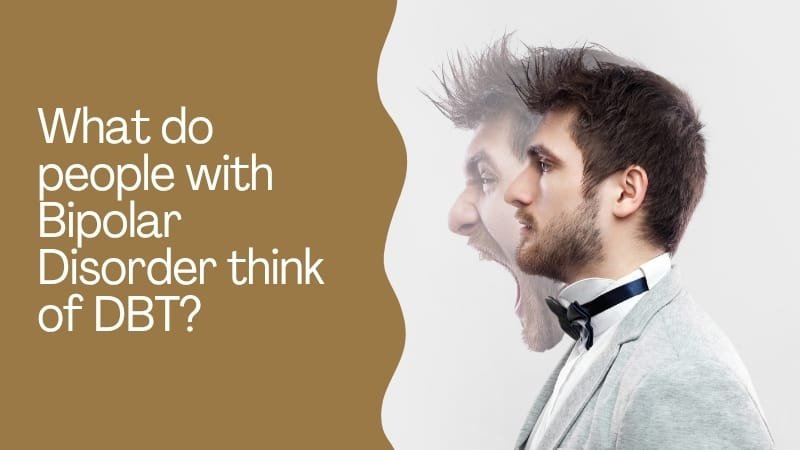Cognitive behavioral therapy (CBT) is the foundation of dialectical behavior therapy (DBT), a type of psychotherapy. To better treat suicidal people with borderline personality disorder (BPD), Marsha M. Linehan created DBT in the late 1980s. Although DBT is based on CBT, it emphasizes the psychosocial component of treatment more. Three different therapeutic settings comprise dialectical behavior therapy: weekly individual psychotherapy sessions, weekly group DBT skills sessions, and phone coaching. But what do people with bipolar disorder actually think of DBT?
The answers are layered, personal, and at times surprising.
What Is DBT?
Dialectical Behavior Therapy (DBT) is a type of cognitive-behavioral therapy (CBT) that emphasizes adjusting acceptance and change. Originally developed by Dr. Marsha Linehan in the late 1980s for people struggling with intense emotional pain and self-destructive behaviors, DBT focuses on building practical life skills.
The therapy is structured around four main areas:
- Mindfulness: Staying present and aware.
- Distress Tolerance: Managing crisis without making it worse.
- Emotion Regulation: Identifying and managing intense emotions.
- Interpersonal Effectiveness: Communicating assertively and maintaining healthy relationships.
While it wasn’t initially designed for bipolar disorder, many clinicians began to notice that the emotional regulation techniques were also incredibly beneficial for those navigating bipolar episodes.
Why DBT Appeals to Some With Bipolar Disorder
One thing indivisual with bipolar disorder often say about DBT is that it offers them tools they didn’t know they needed.
Unlike traditional talk therapy, DBT is action-oriented. Instead of just discussing feelings, it teaches strategies to handle those feelings when they become overwhelming. A person who swings from energetic, impulsive mania to paralyzing depression might find DBT’s emphasis on mindfulness and emotional regulation incredibly grounding.
Many participants appreciate that DBT doesn’t pathologize every emotional experience. In fact, one of its core messages is: Emotions are not bad; it’s how we react to them that can cause suffering. This perspective resonates deeply with people who have felt judged, misunderstood, or “too much” their whole lives.
One individual put it beautifully:
“DBT taught me that my emotions aren’t enemies to fight off but messengers to listen to. That realization changed everything.”
Where DBT Shines for Bipolar Individuals
Here’s where people with bipolar disorder feel DBT really helps:
1. Managing Intense Emotions
Bipolar disorder is synonymous with intense emotional experiences. The skills taught in DBT, like “wise mind” decision-making and crisis coping strategies, give people a toolkit for riding the emotional waves instead of being crushed by them.
Many patients report that they experience fewer “explosive” moments or dramatic mood swings after committing to DBT skills.
2. Reducing Impulsive Behavior
Manic episodes often lead to impulsive decisions—quitting jobs, spending sprees, reckless behavior. DBT teaches distress tolerance techniques that help individuals pause and think critically before acting impulsively.
One person with bipolar II disorder said:
“Learning to pause, breathe, and ground myself during hypomania saved me from making life-altering decisions on a whim.”
3. Strengthening Relationships
Relationships can suffer when moods change rapidly. DBT’s interpersonal effectiveness skills teach individuals how to ask for what they need, set boundaries, and repair relationships after conflicts—skills that many find transformative.
Many people express that after DBT, not only do they better manage their illness, but they also feel less isolated.
Where DBT Might Fall Short
It’s important to note that not everyone finds DBT to be a perfect fit.
1. It’s a Lot of Work
DBT is intensive. It often involves weekly individual therapy, weekly group skills training, and homework assignments. For someone in a deep depressive episode, even attending therapy can feel Herculean, let alone completing worksheets and practicing new skills.
Some bipolar patients have shared that while DBT is valuable, it can feel overwhelming during certain phases of their illness.
2. It Doesn’t Address Everything
DBT is phenomenal for emotion regulation, but it’s not designed to address psychotic symptoms, severe suicidal ideation, or biological causes of mood swings, all of which can accompany bipolar disorder. Medication management and other therapies often remain crucial parts of a comprehensive treatment plan.
As one patient shared candidly:
“DBT helped me cope better, but I still needed medication to stabilize my mood swings. It’s not a replacement—it’s an addition.”
3. The Group Setting Can Be Intimidating
Many DBT programs involve group therapy, which some bipolar individuals find uncomfortable, especially during depressive or anxious periods. Some expressed that they would have preferred one-on-one skills training or modified formats.
What the Research Says
Emerging research is optimistic. Several studies have found that people with bipolar disorder who undergo DBT skills training show reduced mood instability, decreased hospitalization rates, and improved quality of life.
However, experts caution that more large-scale, rigorous studies are needed. Most mental health professionals now recommend DBT as a complementary treatment rather than a standalone cure for bipolar disorder.
Real Voices, Real Experiences
To truly understand what people with bipolar disorder think of DBT, it helps to hear their words:
- “I feel like DBT gave me my life back. I still have ups and downs, but they don’t control me anymore.”
- “It wasn’t a magic fix, but it gave me hope. And skills. Hope and skills are a powerful combination.”
- “It was hard, sometimes frustrating, but ultimately worth it. I wish I’d learned these tools 10 years earlier.”
These reflections show that while DBT isn’t a one-size-fits-all solution, it can be a game-changer for many living with bipolar disorder.
Is DBT Right for Everyone With Bipolar Disorder?
The truth is, DBT isn’t for everyone, and that’s okay. Healing is deeply personal. But for many people with bipolar disorder, DBT offers something few therapies do: a bridge between emotional chaos and emotional mastery.
It teaches that stability isn’t about shutting down emotions; it’s about understanding, respecting, and navigating them skillfully. In a world where bipolar individuals often feel tossed between extremes, that message can be profoundly liberating.
If you’re living with bipolar disorder and considering DBT, know this: You’re not signing up for perfection. You’re signing up for progress—and sometimes, progress is the most radical form of healing there is.


